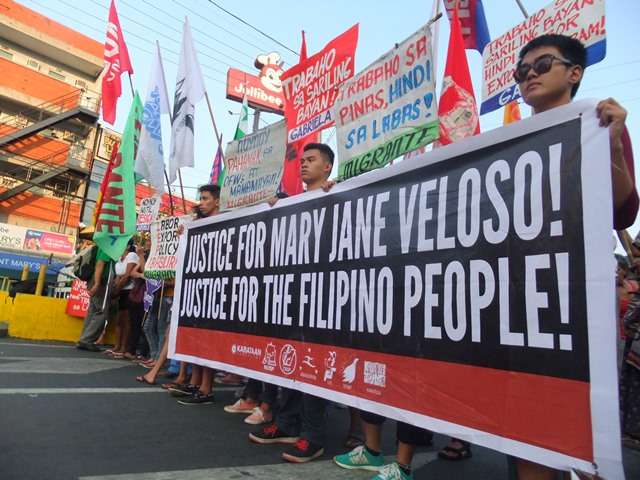Veloso Execution: Damaging Damage Control

Different sectors marched to Mendiola on April 29, 2015 with their appeal to save Mary Jane Veloso from the death row. | Photo by Lito Ocampo
THREE MONTHS into the presidency, the administration of President Rodrigo Duterte still has not found a way to speak in one, clear and consistent voice – a failure that confuses the public at a time when so much is going on and the need for clarity is paramount. This was evident again in the case of Mary Jane Veloso, the Filipino convicted for drug trafficking in Indonesia whose execution has been deferred since last year.
On Sept. 12, a report from The Jakarta Post said that Indonesian President Joko Widodo had announced that he had received the “green light” from Duterte to execute Veloso (“Duterte has given the green light for Mary Jane’s execution: Jokowi”). Veloso’s family and many from the public were naturally shocked. After all, Malacanang spokespersons had been saying that Duterte would discuss Veloso’s case with Widodo, presumably to ask him for clemency, and that she had been granted an indefinite stay of execution.
It should have been a straightforward enough story. The Philippine press sought clarification from the Philippine government but things got confusing when several government officials began speaking to different journalists in an apparent attempt to minimize whatever damage the report could cause the Duterte administration.
Damage Control
Just over a year ago, saving Veloso from execution had become somewhat of a national cause. Widely believed to have been duped by her recruiters into smuggling drugs into Indonesia, Veloso narrowly escaped execution after her alleged illegal recruiter surrendered to the police in Nueva Ecija. The Philippine government appealed to Indonesia to defer her execution, since Veloso would be needed to testify against her recruiter. Indonesia has its own laws on human trafficking and if Veloso is proven to have been the victim of human traffickers, Indonesian law could exonerate her.
Even before his visit to Indonesia, Duterte had already said in a press conference that while he will try to plead for mercy on behalf of Veloso, he will still leave the decision to the Indonesian government.
After the Duterte-Widodo meeting in Jakarta, Department of Foreign Affairs Secretary Perfecto Yasay Jr. was asked whether the Veloso case had been brought up. Yasay was quoted as saying that there was no mention of Veloso in the meeting and that it was “not urgent” since Veloso has been granted an indefinite reprieve from execution.
The following day, Widodo was quoted in the Indonesian press as saying that he and Duterte had actually talked about Veloso’s case. He said he informed Duterte that Veloso had been caught with 2.6 kg of heroin, and that her execution had been delayed. According to Widodo, Duterte responded by saying “go ahead if you want to execute [Veloso].”
The Indonesian report began circulating online, prompting the Philippine media to seek clarification from the government. Presidential spokesperson Ernesto Abella addressed the media, saying that what Duterte actually said was that he will respect Indonesia’s judicial processes and will not interfere with the case.
Yasay also backpedaled from his previous statement that the two chief executives did not talk about Veloso. In an interview with Karen Davila in ANC’s Headstart, Yasay admitted that Duterte told Widodo that he respects Indonesia’s judicial processes and that he would accept the decision of the Indonesian government on the case of Veloso (“Headstart: Duterte may seek clemency for Veloso if PH court says she’s a ‘victim’”). He also said that the president did not ask for clemency as the administration is still awaiting the result of Veloso’s illegal recruiter’s case.
But a Manila Bulletin report quoted Department of Agriculture Secretary Manny Piñol as saying that while President Duterte did say that he respects the laws of Indonesia, he also appealed for clemency (“Piñol: Duterte asked for clemency on Veloso case”). Piñol claimed to be with Duterte during the talk with Widodo, according to the Bulletin.
The inconsistencies of the statements reflect an uncoordinated media policy on the part of the government. Given the tendency of the president to issue outrageous comments, the people in his administration often provide their own interpretations of what he said, flooding the media with conflicting statements that confuse the public even more.
No Clear Stand to Save Veloso
Instead of focusing public attention on various officials’ interpretations of what he said, the press could have pointed out that Duterte is unlikely to be pro-actively committed to asking Widodo for clemency for Veloso in the context of his lethal “war on drugs,” as well as his announced preference for the restoration of the death penalty. It would have been inconsistent for Duterte to do so, and he himself admitted it in an address before members of the 250th Philippine Airlift Wing at Villamor Air Base. Had the source of Duterte’s hesitation in asking for clemency for Veloso been clarified earlier, the confusion created by the conflicting statements of Duterte’s men in their awkward attempts at damage control could have been avoided.
The confusion generated by what has become a common practice among administration officials to explain what Duterte supposedly said is a disservice to the public. The media are rightly expected to clarify the position of the government on significant public issues, especially those on matters of life or death. Reporting what this or that official thinks about what Duterte said — despite their obvious efforts to moderate his often surprising or outrageous statements — is not the way to do it.
Leave a Reply